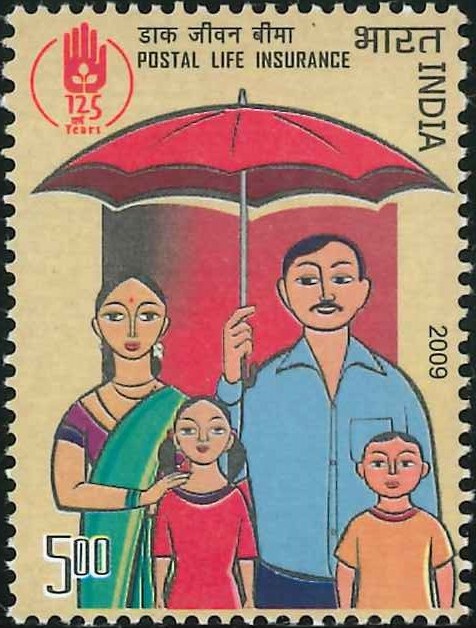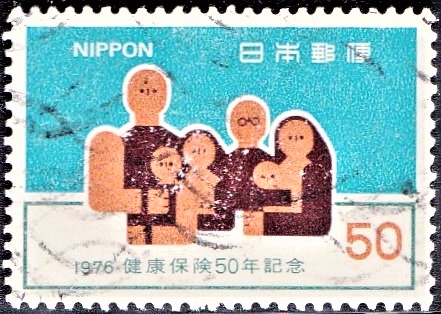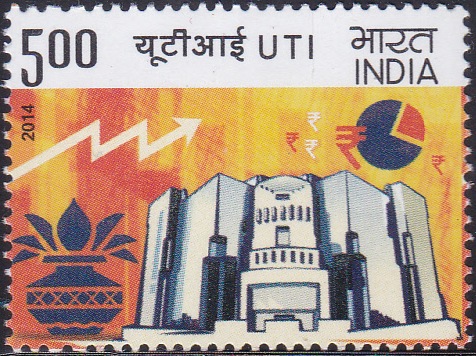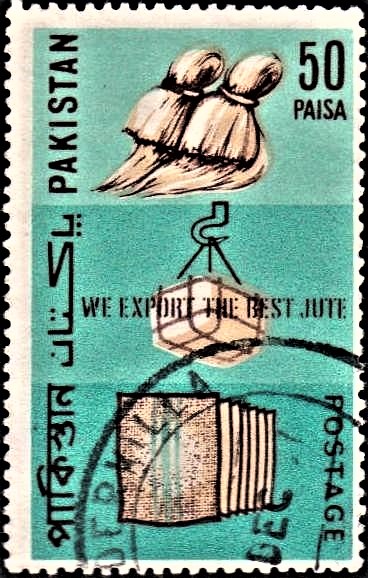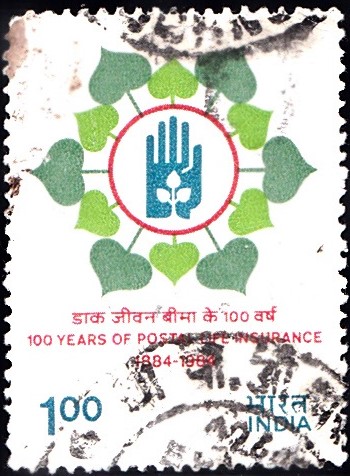
India on Postal Life Insurance 1984
A commemorative postage stamp on the Postal Life Insurance (PLI), oldest life insurer in India :
 Issued by India
Issued by India
Issued on Feb 1, 1984
Issued for : The Posts & Telegraphs Department feels proud in commemorating the centenary of Postal Life Insurance by issuing a special stamp.
Description of Designs : The design prepared by Shashi Kant Jha shows the logo of Postal Life Insurance encircled by light green and dark green leaves of peepul tree. The peepul tree represents growth, stability and protection. The light green leaves show youth and dark green leaves indicate maturity. The first day cover has been designed by C. R. Pakrashi and the cancellation by Alka Sharma.
Type : Stamp, Postal Used
Colour : Multicolour
Denomination : 100 Paise
Overall size : 3.91 x 2.90 cms.
Printing size : 3.55 x 2.54 cms.
Perforation : 13 x 13
Paper : Unwatermarked adhesive stamp paper
Number printed : 15,00,000
Number per issue sheet : 35
Printing process : Photogravure
Printed at : India Security Press
About :
- Postal Life Insurance, introduced on 1st Feb., 1884, is one of the oldest welfare schemes for Government employees. Even in the last century, the Govt. of the day was greatly exercised about the financial distress of its employees and their dependents, particularly after their retirement from service or decease. The question of establishing an institution to mitigate the hardships of employees was considered at length and it was in 1884 that the suggestion of the then Director General of the Post Office for the introduction of Postal Life Insurance was implemented.
- Initially, the scheme was introduced on a limited scale on an experimental basis and was meant only for the postal employees. Later, its benefits were extended to the telegraph employees. Gradually, the scheme was extended to the employees of other Govt. departments. Today, it caters not only to the Govt. servants of the Centre and the States but also to the employees of the Local Bodies, Government aided educational institutions, Universities, Nationalised Banks and some other autonomous and financial institutions of the Govt. of India.
- The scheme at the time of its inception made provision only for life insurance and two classes of monthly allowances, which were abolished in 1930. The Endowment Policy was introduced in 1898 and later the Convertible Whole Life Insurance Policy was introduced. For still greater benefits the Postal Life Insurance is introducing the Anticipated Endowment Insurance Policy from 1st February, 1984.
- The Postal Life Insurance Fund is administered by the Govt. of India exclusively in the interest of the policy-holder. Convenient terms are offered to give greater benefits to the insurants. Amongst the advantages of the scheme are deduction of premia at source, availability of the facility of nomination, coverage of the risks involved in war without payment of enhanced rates of premia, easy availability of loans and easy terms for their repayment, lower premium and higher bonus.
- Though, it has had its ups and downs, owing to its inherent advantages, Postal Life Insurance has grown into a highly evolved institution, operating all over the country. The magnitude of the growth in its operations can be gauged from the fact that from a mere 4656 active policies representing an aggregate insurance of Rs. 73.40 lakhs in the year 1900 and 92,000 active policies for an aggregate amount of insurance of Rs. 19.10 crores in 1947, the number of policies in force has gone up to 10,06,910 of a value of the order of Rs. 685.32 crores in 1983. The insurance fund balance has also similarly registered a sharp increase in recent years. From a mere Rs. 14.36 lakhs in 1900 and Rs. 11.35 crores in 1947 it has grown to a hefty Rs. 190.63 crores in 1983.
- After independence, with the growth in the Governmental activities, lakhs of Govt. and semi-Govt. employees have reposed their confidence in Postal Life Insurance which has reciprocated their faith with matching returns. Because of its built-in capability to serve its clients with faith and dedication, this Department is confident that the institution will continue to spread happiness and well-being amongst its clients for many years to come.



